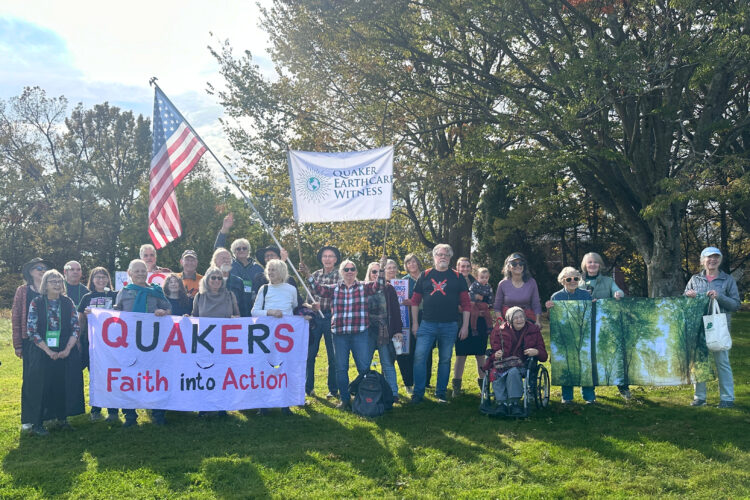Quakers Practicing Sustainability

This article is part of QEW’s Pamphlets for Sharing Series.
Download it here or email info@quakerearthcare.org
Practicing Sustainability—What Does It Mean for Friends?
Caterpillars undergo transformation into butterflies; tadpoles into frogs. This is metamorphosis. Can we transform our culture and our individual lives to recognize and nurture the spirit in all Creation? Can we change our actions and habits to enable the earth’s systems to heal for the benefit of ourselves and future generations.This is the challenge of our times…
Differing ideas about the meaning of sustainability
The United Nations World Commission on Environment & Development suggested in 1987 that sustainable development means, “…to meet the needs of the present without compromising the ability of future generations to meet their own needs” (Brundtland Report, 1987).
Herman Daly in 1991 said that a sustainable society must be based on using renewable resources at rates that do not exceed their capacity to renew themselves; using non-renewable resources at rates that do not exceed our capacity to substitute for them; and using no resources at rates that exceed the capacity of the natural world to assimilate or process the wastes associated with their use (Steady State Economics, 1991).
Lester Brown et al. said that a sustainable society requires a population in balance with its natural support systems, an energy system that does not raise the level of greenhouse gases, and a level of material demand that neither exceeds the sustainable yield of forests, grasslands or fisheries, nor systematically destroys other species (Saving the Planet, 1992).
Stanley Euston and William Gibson said, “We interpret sustainability to mean a condition in which natural systems and social systems survive and thrive together indefinitely.”
Religious faiths and sustainability
The twin issues around which the world’s future revolves are justice and ecology. Justice points to the necessity of correcting maldistribution of the products of the Earth and of bridging the gap between rich and poor countries. Ecology points to humanity’s dependence upon the Earth. Society must be so organized as to sustain the Earth so that a sufficient quality of material and cultural life for humanity may be sustained indefinitely. A sustainable society which is unjust can hardly be worth sustaining. Humanity now has the responsibility to make a deliberate transition to a just and sustainable society…” – The World Council of Churches, 1979
We are building towards the climax of crisis. The spiritual crisis is folding into the ecological crisis, and the ecological crisis is folding into the economic crisis. …Challenging market economics with a biblical sense of the goodness of God in Creation is to join a spiritual struggle. Faith in God, solidarity with the suffering poor and all other forms of life demands that we take a stand and say, This destruction must stop.
“We must be perfectly clear about the implications of undertaking this responsibility. It is more than just setting up household recycling bins, growing organic vegetables, or riding a bike to work. It is more than a talking job. It is a renovation which will change everything: the way we do business, the way we eat, the way we travel, the houses we build, the products and services we can expect and the prices we pay for them, the way we feel about trees, and the way we worship God.” — Keith Helmuth, 1990, for Britain Yearly Mtg.
Ecological sustainability as viewed by Quaker Earthcare Witness (Approved at Quaker Earthcare Witness Annual Meeting, October 1998):
Friends have long-standing testimonies on Peace, Simplicity, Equality, Community, and Integrity. These testimonies have been proclaimed not in words but by the way Friends have lived out the details of their lives: in plain speech and plain dress; in refusal to do hat honor, swear oaths, or gamble; in the avoidance of violence as a means of dealing with conflict; and in prison ministry and myriad other ways.
In this century, rapid growth in population, technology, and industry have been accompanied by resource depletion and environmental pollution. These societal changes lead us, members of QEW, to express our deep concern for Ecological Sustainability, or sustainable living, as an emerging testimony, and to seek the Light as to how to carry it out in the details of daily life.
There is overlap in the meanings and practices of our Quaker testimonies. QEW believes that Sustainability is a concept that relates to all our Testimonies, relates each of them to the future, and helps to weave them together in our lives. Peace without Equality…or Community without Sustainability…or Sustainability without Simplicity, tend to become meaningless; each enriches the others in a prophetic way that challenges our work in society and our care for the Earth.
On a spiritual level there is abundance to sustain us: abundance of compassion and love, abundance of giving, healing, and thanksgiving. On a physical level, we can start moving toward a recognition of this by working toward Sustainability.
Sustainability as a concept has recently acquired new spiritual depth of meaning to include a resolve to live in harmony with biological and physical systems, and to work to create social systems that can enable us to do that. It includes a sense of connectedness and an understanding of the utter dependence of human society within the intricate web of life; a passion for environmental justice and ecological ethics; an understanding of dynamic natural balances and processes; and a recognition of the limits to growth due to finite resources. Our concern for Sustainability recognizes our responsibility to future generations, to care for the Earth as our own home and the home of all that dwell herein. We seek a relationship between human beings and the Earth that is mutually enhancing.
Let us ask the Spirit for the clarity to recognize the ways we may be nourishing the seeds of ecological destruction, and for the strength to make the choices that will nourish seeds of change, so that Sustainability and the Integrity of Creation will be a visible aspect of Friends’ testimony everywhere. We encourage Friends to proceed with Divine guidance, with love, and with a commitment for action on the above principles in our daily lives. Let us be called to take meaningful steps to respond to the disproportionate distribution of the Earth’s resources; to minimize the effects of cultures of affluence and over-consumption; and to strive for ecologically and economically regenerative communities with a creative simplicity: to be a Peace in this sacred place, our Earth. With humility, we invite Friends and their Meetings to join in this transformation. “Let our lives speak…”
Some queries to consider as individuals and as Friends
- How do our testimonies of peace and simplicity relate to ecological concerns?
- How can I live simply that others may simply live?
- Are my purchases really necessary?
- How can I support and regenerate my local economy?
- How can I support sustainable practices in food production and energy consumption?
- Should we in North America not be seeking ways to cut down our consumption?
- How can we engage in Friendly dialogue with our political and business leaders on how to change laws, policies and taxes to foster sustainable resources management?
- How do we develop and support an ecological witness on national and international policy?
- How can we stop supporting unsustainable practices?
- How can we cooperate more within our Meeting Community for mutual help and more efficient use of resources?
We have a responsibility to support a just transition to a more sustainable way of life, as individuals, as members of our Meetings, as a Society, and as members of the wider world.
This means that we in North America need radically change the way we live. We need to cut down on our consumption by every means possible. We need to challenge our political and corporate leaders to change the paradigm from economic growth to ecological sustainability.
- Find ways to use cars less or do without.
- Work for practical, efficient public transportation systems where you live.
- Limit the number of children you have.
- Support family planning programs that respect women’s rights and aspirations and support their education.
- Buy local, organically grown food with minimal packaging, or grow your own.
- Purchase clothing, furniture, building materials, tools, etc., used or, if new, from reliable sources who have produced the items sustainably and equitably.
- Reduce your need for newly manufactured items.
- Recycle all that you can, and purchase items made from recycled products.
- Invest savings in socially responsible funds or with socially responsible companies, or live without excess funds.
- Support “green businesses.”
- Work in your community with others on issues of sustainability and pollution prevention.
- Form a study circle to learn about the economic disparities of globalization on the Earth Community.
- Create ways to share resources.
- Reduce your use of energy.
Selected resources
Adams, Anne, ed. The Creation Was Open to Me. Somerset, England: Quaker Green Action, 1996.
Brower, Michael, and Leon Warner. The Consumer’s Guide to Effective Environmental Choices. New York: Three Rivers Press, 1999.
Brown, Lester R., et al., eds. State of the World—A Worldwatch Institute Report on Progress Toward a Sustainable Society, 1984-2003.
Brown, Lester R., et al., eds. Vital Signs—The Trends That Are Shaping Our Future. New York: W. W. Norton & Co., 1992-1998.
Daly, Herman. Beyond Growth. Boston: Beacon Press, 1996.
Hawken, Paul. The Ecology of Commerce. New York: HarperBusiness, 1993.
Hemenway, Toby. Gaia’s Garden: A Guide to Home-Scale Permaculture. White River Junction, Vt.: Chelsea Green Publishers, 2001.
Korten, David. The Post-Corporate World: Life After Capitalism. San Francisco: Baret-Kohler Publishers, 1999.
Orr, David W. Earth in Mind—On Education, Environment, and the Human Prospect. Covelo, Calif.: Island Press, 1994.
Shiva, Vandana. Stolen Harvest: The Highjacking of the Global Food Supply. Cambridge: South End Press, 2000.
Suzuki, David. The Sacred Balance. Vancouver, B.C.: Greystone Books, 1997.
Wackernagel, Mathis, and William Rees. Our Ecological Footprint. Gabriola Island, B.C.: New Society Publishers, 1996.

